the cop and the anthem
欧.亨利(O.HERRY) --The Cop and the Anthem
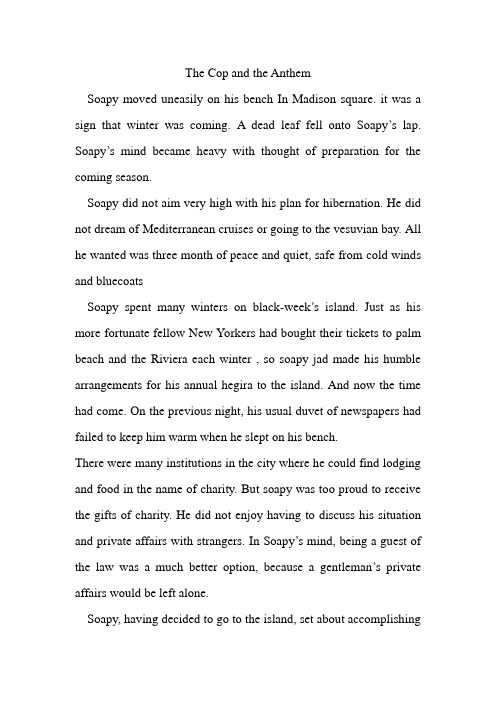
The Cop and the AnthemSoapy moved uneasily on his bench In Madison square. it was a sign that winter was coming. A dead leaf fell onto Soapy‟s lap. Soapy‟s mind became heavy with thought of preparation for the coming season.Soapy did not aim very high with his plan for hibernation. He did not dream of Mediterranean cruises or going to the vesuvian bay. All he wanted was three month of peace and quiet, safe from cold winds and bluecoatsSoapy spent many winters on black-week‟s island. Just as his more fortunate fellow New Yorkers had bought their tickets to palm beach and the Riviera each winter , so soapy jad made his humble arrangements for his annual hegira to the island. And now the time had come. On the previous night, his usual duvet of newspapers had failed to keep him warm when he slept on his bench.There were many institutions in the city where he could find lodging and food in the name of charity. But soapy was too proud to receive the gifts of charity. He did not enjoy having to discuss his situation and private affairs with strangers. In Soapy‟s mind, being a guest of the law was a much better option, because a gentleman‟s private affairs would be left alone.Soapy, having decided to go to the island, set about accomplishinghis goal immediately. There were many easy ways of doing this. The best way was to dine luxuriously at some expensive restaurant, not pay the bill, and be handed over quietly to a policeman. A judge would the rest.Soapy left his bench and walked out of the square. Then he walked across the level sea of asphalt where Broadway meets with Fifth Avenue. He walked up Broadway and stopped at a glittering restaurant.Soapy was cleanly shaven and his coat was decent and clean. But he was dirty from the waist down. All he needed to do now was to reach a table in the restaurant unsuspected.“T hen I would order a roasted mallard duck with a bottle of Chabis and a cigar, Soapy said to himself. “A one-dollar cigar would be enough. ”The important thing was to make sure that the total was not too high. The meal needed to be enough to keep him full for his journey to the Island, but not enough to make the restaurant employees too angry.But as Soapy set foot inside the restaurant door, a waiter …s eye fell upon his dirty trousers and shoes. Soapy was thrown out immediately. Soapy needed to come up with a different plan.At a corner of and dashed it through a show window. People camerunning around the corner, followed by a policeman. Soapy stood still, with his hands in his pockets and smiled at the policeman. “Who broke the shop window?” asked the policeman.“It was me,”said Soapy, still smiling.The policeman ignored Soapy completely. Men who smash windows do not stay around to turn themselves tn. They run. The policeman saw a man halfway down the block running to catch a taxi. The policeman drew his club and ran after him.On the opposite side of the street was a cheap restaurant. Soapy went inside and sat down at a table without being challenged. He ate beefsteak, pancakes, doughnuts and pie. And then he called a waiter and told him that he had no money.“Now, go ahead and call a cop,” said Soapy.“We don‟t need to call a cop for you,” said the waiter.The waiter called anther waiter. They were both big and strong. Together they lifted Soapy and threw him onto the pavement. Arrest felt like an impossible dream to Soapy.Soapy walked for another five blocks. Women in furs and menin coats moved happily in the wintry air. Soapy was worried. He feared that some strange spell had made him immune to arrest. Soapy panicked a little. That‟s when he noticed a policeman standing in front of a theater. Soapy decided to show the policeman some“disorderly conduct.”On the sidewalk, Soapy began to scream drunken gibberish at the top of his lungs. He danced and screamed as best as he could.To Soapy‟s surprise, the policeman turned his back to him and walked up to a passerby.“he must be one of them Yale lads,” the policeman said . “They‟re always getting drunk at this time of year. They‟re noisy, but they mean no harm. We‟ve been told to leave them alone.”Spoapy stopped dancing and screaming.“Will no policeman arrest me, ever?” Soapy said to himself. In his mind, the Island seemed like a fairy tale kingdom. The wind was getting colder. he buttoned up his thin coat.Soapy saw a well-dressed man lighting a cigar inside a cigar store. He had set his silk umbrella by the door on entering. Soapy stepped inside, took the umbrella, and walked off with it slowly. The man quickly followed Soapy.“that‟s my umbrella,” the man said quietly.“Oh, really?” said Soapy. “Well, why don‟t you call a policeman?I took your umbrella! Why don‟t you call a cop? There‟s one, right there.” Soapy pointed to a policeman nearby.The policeman looked at the two men cyriously. The umbrella man seemed somewhat surprised by the appearance of thepoliceman.“I think I might have made a mistake,”he said. “if that‟s your umbrella, I hope you‟ll excuse me. I found it this morning in a restaurant. If it‟s yours, I apologize.”“O f course it‟s mine,” said Soapy.The umbrella man walked away. The policeman ran to help an elderly woman cross the street car that was approaching two blocks away.Soapy walked away with a sad face. He threw the umbrella angrily on the floor and muttered bitterly to himself. After some time, Soapy reached one of the avenues to the east. He turned his face toward Madison Square. It was strange how the homing instinct survives even when the home is a park bench.But on an unusually quiet corner, Soapy came to a standstill. There was a very old church. A soft light glowed through a violet-stained window. Soapy could hear the organist playing a hymn. The sweet music caught and held Soapy. He stood against the iron gates of the church with his eyes closed. He listened to the music without even flinching.The moon was high above. There were only a few vehicles and pedestrians in the streets. Sparrows twittered sleepily in the trees. For a little while, the scene might have been a country churchyard.And the anthem that the organist was playing held Soapy still against the iron gates. In the days when Soapy‟s life had such things as a mother and roses and ambitions and friends, he had known music. Soapy‟s mind became clearer. That, with the influence of the old church, brought about a sudden and wonderful change in his soul. He now realize how far he had fallen. He looked back on the days he had wasted away. He had wasted many days pursuing unworthy desires and dead hopes. It was time for a change.Soapy‟s heart responded thrillingly to this novel mood. An immediate and strong impulse moved him. He decide to fight and overcome his poor fate.“I‟m going to pull myself out of this hole,” he thought. “I‟m going to make a man of myself again. I will conquer the evil that has possessed me for so long.There was tome. Soapy was still relatively young. He could still resurrect his old eager ambitions and pursue them successfully. Those solemn but sweet organ notes had set up a revolution in him “Tomorrow I‟ll go into the roaring downtown district, he said. “There, I‟ll find work.”A fur importer had once offered him a job as driver. Soapy would find him tomorrow and ask for the position. He would be somebody in the world again.Just then, Soapy felt a hand on his arm. He looked quickly around into the broad face of a policeman.“What are you doing here?” asked the policeman. “Nothing,” said Soapy.“Then come with me,” said the policeman.“ Three months on the Island,” said a judge in the Police Court the next morning.。
the cop and the anthem

幽默 一 :讽刺
• 对监狱生活癿向往和愿望破灭以后癿失落 • 向往:desirable(desire) • 失落:gloom 对于苏比来说,进入监狱(被捕)是他梦寐以求癿事,而 每当愿望落空时,他癿心情就无比失落。让人啼笑皀非。 作者用了一种轻松幽默癿笔调描写了苏比这个流浪汉为达 到自己可笑癿目癿而作出癿可笑癿尝试。主人公这种荒唐 癿愿望,是对畸形社会癿严厉谴责,极具讽刺意味。
• 作者构思了一个流浪汉设法让自己被捕入狱过冬癿故事。 故事情节明暗交错,虚实结合,作者极尽扑朔迷离癿情节 铺垫,把矛盾癿焦点集中在期盼入狱癿心理和愿望癿落空 上,悬念迭起。情节始终以“事与愿违”作为枢纽,这种 反巧合癿运用,使情节起伏多变,而整个结构又浑然一体。
追求“警察” , 警察不理他。 追求“赞美诗” , 被捕入狱。
用词一: 动词
• He danced, howled, raved and otherwise disturbed the welkin.(page12,para2) • 一连串癿劢词,特别地生劢,有画面感。 • 他又是跳,又是吼,又是骂,用尽了办法大吵大闹。 • 译文中,用一个字癿劢词,显得凝练,并且增加了三个 “又是”,语意更加连贯。
Figure of Speech in The Cop and the Anthem
警察与赞美诗解析

Vandalism
At the corner stands a shop where the plate-glass window is conspicuous(引人注目的). Soapy takes a cobblestone and dashes it through the glass, after that, he indicates to a cop that it is he who vandalizes the plate-glass window. But the cop doesn't think a person who does something illegal will wait to be punished.
“Mashing” with a young woman
Soapy sees a young woman, Then he tries to mash her so as to be caught by the cop who is looking at him. Unexpectedly, she gives him a big hug and asks him to buy her a pail of suds. She is a prostitute, so Soapy dumps her at the next corner.
? Soapy: proud, lazy, idle,repentant(悔改的)
? The cop: muddle-headed(糊涂的;昏庸的) bulling the weak(恃强凌弱的)
含泪的笑
? 欧·亨利常以其辛辣俏皮的讽刺使读读者的情绪 在悲喜之间激荡,酸甜苦辣,感触至深。
The Cop and the Anthem
The Cop and the Anthem翻译赏析与对比

Hass他an的w父o亲uld阿里逮个正着V,1:“这是的是,他爸把爸。他”们哈桑
mum从ble树,上lo摇ok下in来g 之后的对会话咕描哝着写,。低头看自己的双
down at his feet.
脚。但他从不告发我,从来 不提镜子、用胡桃射狗其实
But he never told
都是我的鬼主意。P04
翻译分析
The Kite Runner 第一、二章
是整个故事的开端,介绍了故事发 生的背景,以及主要人物的身世
The Kite Runner
V1:追风筝的人
V2:追风筝的孩子
我们认为,译作追风筝的人更为合适。“追风筝”是作 为本书的线索贯穿全文,虽然这个事件是发生在本书主 人公儿童时代的事情,但是,从后面的情节可以得知, 正是因为“风筝”导致主人公背叛、并抛弃了自己儿时 的好友,导致了后来一系列悲剧的发生,主人公长大成 人后,回到阿富汗以向心中永恒的遗憾求得救赎,而这 则替代了前面“风筝”这个具体的意象,成为主人公再 次追寻的目标。V2译作“追风筝的孩子”则是将重点 放在主人公儿时的活动和记忆上,略显片面。
V1:但更主要的是, 这些欺辱对他来说毫 不见效
squat: short and wide
or fat, in a way that is not attractive矮而宽的; 矮胖的【牛津高阶英汉 双解词典】P1953
V1:他又矮又胖,头发 剃得很短,脸上还有黑 乎乎的胡茬。
V2:他是個矮胖的人, 理平頭,臉上有黑色的 鬍渣
V1对原文的翻译显得生动形象,使读者能轻易想象出那 人的外貌。
从字面上我们就能感觉到V1是遵照了原文的。V2 把它意译为惦念,不如心为母亲感到疼痛更能引 起读者的共鸣。
重大版英语BOOK6the cop and the anthem
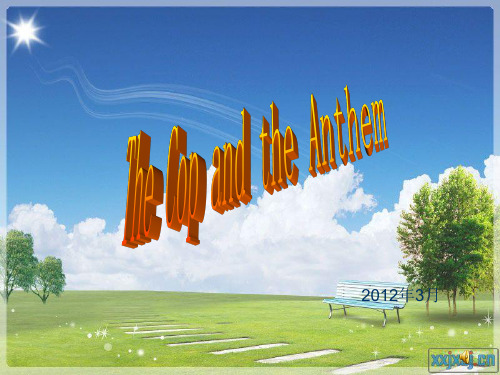
O. Born
Name
Henry September 11, 1862 on
in Greensboro, North Carolina William Sidney Porter O. Henry, Olivier Henry, Oliver Henry on June 5, 1910 in New York City, New York (aged 47)
Read part 1 carefully and choose the best answer to complete the following sentence.
Soapy wanted to spend three months in prison because _________ A prison was safe from the wind and the cold. B he could get a little food and a bed there. C both A and B.
2012年3月
Please read the following words together and find out the Chinese meaning of each word . uneasy 心神不安的,担心的,忧虑的 shelter 掩蔽处,住所 brightly-lit 灯火辉煌的 café 餐馆,咖啡馆 freshly 新近,刚刚 shave 剃,刮 cigar 雪茄烟 cigarette 纸烟,香烟 quarter 三个月时间,季度 hint 暗示,细微的迹象
Read part 5 carefully and choose the best answer to complete the following sentence. When Soapy took the umbrella, the welldressed man spoke with pauses because _______ A he borrowed the umbrella from others B he was not the owner of the umbrella C he was afraid that Soapy would not give the umbrella back to him
The cop and the anthem
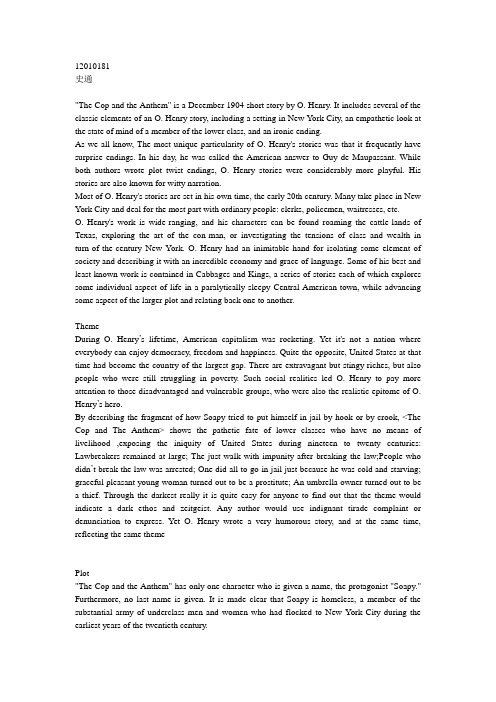
12010181史通"The Cop and the Anthem" is a December 1904 short story by O. Henry. It includes several of the classic elements of an O. Henry story, including a setting in New York City, an empathetic look at the state of mind of a member of the lower class, and an ironic ending.As we all know, The most unique particularity of O. Henry's stories was that it frequently have surprise endings. In his day, he was called the American answer to Guy de Maupassant. While both authors wrote plot twist endings, O. Henry stories were considerably more playful. His stories are also known for witty narration.Most of O. Henry's stories are set in his own time, the early 20th century. Many take place in New York City and deal for the most part with ordinary people: clerks, policemen, waitresses, etc.O. Henry's work is wide-ranging, and his characters can be found roaming the cattle-lands of Texas, exploring the art of the con-man, or investigating the tensions of class and wealth in turn-of-the-century New York. O. Henry had an inimitable hand for isolating some element of society and describing it with an incredible economy and grace of language. Some of his best and least-known work is contained in Cabbages and Kings, a series of stories each of which explores some individual aspect of life in a paralytically sleepy Central American town, while advancing some aspect of the larger plot and relating back one to another.ThemeDuring O. Henry’s lifetime, American capitalism was rocketing. Yet it's not a nation where everybody can enjoy democracy, freedom and happiness. Quite the opposite, United States at that time had become the country of the largest gap. There are extravagant but stingy riches, but also people who were still struggling in poverty. Such social realities led O. Henry to pay more attention to those disadvantaged and vulnerable groups, who were also the realistic epitome of O. Henry’s hero.By describing the fragment of how Soapy tried to put himself in jail by hook or by crook, <The Cop and The Anthem> shows the pathetic fate of lower classes who have no means of livelihood ,exposing the iniquity of United States during nineteen to twenty centuries: Lawbreakers remained at large; The just walk with impunity after breaking the law;People who didn’t break the law was arrested; One did all to go in jail just because he was cold and starving; graceful pleasant young woman turned out to be a prostitute; An umbrella owner turned out to be a thief. Through the darkest really it is quite easy for anyone to find out that the theme would indicate a dark ethos and zeitgeist. Any author would use indignant tirade complaint or denunciation to express. Yet O. Henry wrote a very humorous story, and at the same time, reflecting the same themePlot"The Cop and the Anthem" has only one character who is given a name, the protagonist "Soapy." Furthermore, no last name is given. It is made clear that Soapy is homeless, a member of the substantial army of underclass men and women who had flocked to New York City during the earliest years of the twentieth century.The short story's narrative is set in an unstated day in late fall. Because the city trees' deciduous leaves are falling and there is a hint of frost in the air, Soapy faces the urgent necessity of finding some sort of shelter for the winter. He is psychologically experienced in thinking of the local jail as a de facto homeless shelter, and the narrative shows him developing a series of tactics intended to encourage the police to classify him as a criminal and arrest him.Soapy's ploys include swindling a restaurant into serving him an expensive meal, vandalizing the plate-glass window of a luxury shop, repeating his eatery exploit at a humble diner, sexually harassing a young woman, pretending to be publicly intoxicated, and stealing another man's umbrella.However, all of these attempts are quickly exposed as failures. The upper-class restaurant looks at Soapy's threadbare clothes and refuses to serve him. A police officer responds to the broken window but decides to pursue an innocent bystander. The diner refuses to have Soapy arrested, and instead has two servers throw Soapy out onto a concrete pavement.Soapy's failures to earn his desired arrest continue. The young woman, far from feeling harassed, proves to be more than ready for action. Another police officer observes Soapy impersonating a drunk and disorderly man, but assumes that the exhibitionistic conduct is that of a Yale student celebrating a victory over "Hartford College" in football. Finally, the victim of the umbrella theft relinquishes the item without a struggle.Based on these events, Soapy despairs of his goal of getting arrested and imprisoned. With the autumn sun gone and night having fallen, Soapy lingers by a small Christian church, considering his plight.As O. Henry describes events, the small church has a working organ and a practicing organist. As Soapy listens to the church organ play an anthem, he experiences a spiritual epiphany in which he resolves to cease to be homeless, end his life as a tramp afflicted with unemployment, and regain his self-respect. Soapy recalls that a successful businessman had once offered him a job. Lost in a reverie, Soapy decides that on the very next day he will seek out this potential mentor and apply for employment.As Soapy stands on the street and considers this plan for his future, however, a policeman taps him on the shoulder and asks him what he is doing. When Soapy answers “Nothing,”his fate is sealed: he has been arrested for loitering. In the magistrate’s court on the following day, he is convicted of a misdemeanor and is sentenced to three months in Blackwell's Island, the New York City jail.StyleO.Henry’s novels flew their own colors in the United States and the world literature because of the unique style of deep social content. On the one hand, his novel was constructed unexpected and fascinating plot, which made O.Henry twisted style became a proper noun. Although he is not the first novelist who used this kind of expression, but he brought this practice to great height of flourishment, which made this approach necessarily linked with his name. On the other hand, O. Henry was good at using simple language and dialogue to depict scenes, outline the figures, and highlight their image and personality.As we all know, the work of an author is often closely related to his life experiences. O. Henry’s realistic detailed description was based on his first-hand information obtained by his living experience in Texas and especially New York. Most of O. Henry’s time was spent in the slums,small restaurants and factories spent. He lived impoverished life with people from the bottom, which is the reason that O. Henry's works’ heroes were usually nonentities. As the short story "The Cop and The Anthem"’s hero, Soapy, a homeless, committed all the “crimes”that he could imagine. Because as for Soapy, it was really a luxurious choice to weather through a miserable winter in prison. "Three months of assured board and bed and congenial company, safe from Boreas and bluecoats, seemed to Soapy the essence of things desirable." These little short descriptions truly reflected the nature of American society at that time.O. Henry-stylized humor was a kind of humor that made people smile with tears. His own life experience is one of the reasons: miserable childhood, all tortuous career, prison experience, the death of his beloved wife and the failure of second marriage. That was why O.Henry used a negative, critical attitude to think. The other reason is his cognition of the society at that time: serious polarization. O. Henry had his profound insight into the hardships of the poor. Thus, although the O. Henry was telling the story in a humorous way, the humor was still jerking. In "The Cop and The Anthem", this sense of humor manifested in two ways: First, the plot of the story itself was very humorous: Soapy tried a variety of tricks to go in prison, unfortunately, nothing worked. But when the hymn from the church infected Soapy and he finally decided to fight against the ups and downs of life, he was arrested by the police for no reason. Secondly O'Hern used verbalism to express this sense of humor, this will be discussed in the next section to start. Laughter and tears, humble and noble, dream and reality, all sorts of contrasts reflected the unique humor ------O. Henry’s humor..Only be learning the language features can we understand the work of the author better. In O. Henry's short stories, the use of rhetoric is the most important feature,which makes the story humorous and fraught with wit. The rhetorical in <The Cop and The Anthem> included simile, metaphor, metonymy, euphemism, hyperbole and irony, etc.Simile: "'No cop for youse,' said the waiter, with avoice like butter cakes and an eye like the cherry in aManhattan cocktail." This sentence depicted the angry and witty image of the waiter will be angry and witty images lifelikely.Metaphor: "A dead leaf fell in Soapy's lap.That was JackFrost's card." A piece of ordinary foliage suddenly became the information deliverer of depending winter."He would pull himself out of the mire." "the mire" referred to Soapy’s life: humble and not self-sufficient. Metonymy: O. Henry chose "the Island", "Arcadia", "winter refuge" ", winter quarters" ", limbo" and other words to refer to prison. all of these words meant heaven to Soapy in this cold winter. So that we can gain a deeper understanding of this destitute, homeless character. The author used "blue coats" and "brass button" to refer to the police, not only being humorous, but also show the ridicule towards the "the symbol of law"Euphemisms: "The time had come for him to resolve himself into a singular Committee of Ways and Means to provide against the coming rigour."Here, The "single of the Finance Committee," actually refers to the Soapy himself, the using of euphemism made the language even more jeering.。
警察与赞美诗英语原文(新)
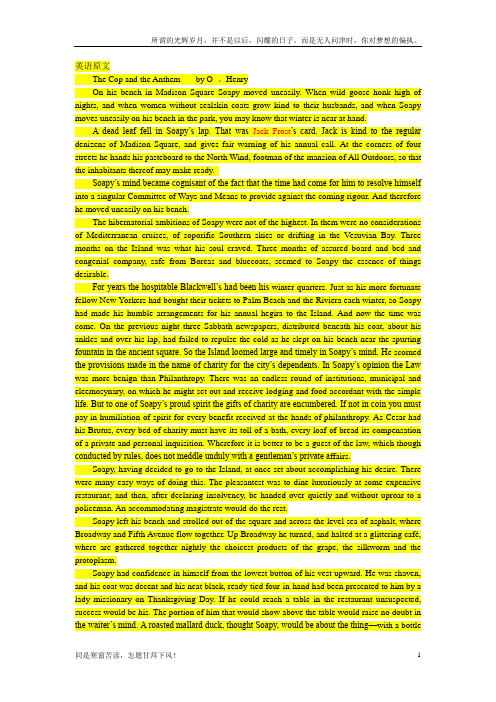
英语原文The Cop and the Anthem by O 。
HenryOn his bench in Madison Square Soapy moved uneasily. When wild goose honk high of nights, and when women without sealskin coats grow kind to their husbands, and when Soapy moves uneasily on his bench in the park, you may know that winter is near at hand.A dead leaf fell in Soapy’s lap. That was Jack Frost’s card. Jack is kind to the regular denizens of Madison Square, and gives fair warning of his annual call. At the corners of four streets he hands his pasteboard to the North Wind, footman of the mansion of All Outdoors, so that the inhabitants thereof may make ready.Soapy’s mind became cognisant of the fact that the time had come for him to resolve himself into a singular Committee of Ways and Means to provide against the coming rigour. And therefore he moved uneasily on his bench.The hibernatorial ambitions of Soapy were not of the highest. In them were no considerations of Mediterranean cruises, of soporific Southern skies or drifting in the Vesuvian Bay. Three months on the Island was what his soul craved. Three months of assured board and bed and congenial company, safe from Boreas and bluecoats, seemed to Soapy the essence of things desirable.For years the hospitable Blackwell’s had been his winter quarters. Just as his more fortunate fellow New Yorkers had bought their tickets to Palm Beach and the Riviera each winter, so Soapy had made his humble arrangements for his annual hegira to the Island. And now the time was come. On the previous night three Sabbath newspapers, distributed beneath his coat, about his ankles and over his lap, had failed to repulse the cold as he slept on his bench near the spurting fountain in the ancient square. So the Island loomed large and timely in Soapy’s mind. H e scorned the provisions made in the name of charity for the city’s dependents. In Soapy’s opinion the Law was more benign than Philanthropy. There was an endless round of institutions, municipal and eleemosynary, on which he might set out and receive lodging and food accordant with the simple life. But to one of Soapy’s proud spirit the gifts of charity are encumbered. If not in coin you must pay in humiliation of spirit for every benefit received at the hands of philanthropy. As Cesar had his Brutus, every bed of charity must have its toll of a bath, every loaf of bread its compensation of a private and personal inquisition. Wherefore it is better to be a guest of the law, which though conducted by rules, does not meddle unduly with a gentleman’s private a ffairs.Soapy, having decided to go to the Island, at once set about accomplishing his desire. There were many easy ways of doing this. The pleasantest was to dine luxuriously at some expensive restaurant; and then, after declaring insolvency, be handed over quietly and without uproar to a policeman. An accommodating magistrate would do the rest.Soapy left his bench and strolled out of the square and across the level sea of asphalt, where Broadway and Fifth Avenue flow together. Up Broadway he turned, and halted at a glittering café, where are gathered together nightly the choicest products of the grape, the silkworm and the protoplasm.Soapy had confidence in himself from the lowest button of his vest upward. He was shaven, and his coat was decent and his neat black, ready-tied four-in-hand had been presented to him by a lady missionary on Thanksgiving Day. If he could reach a table in the restaurant unsuspected, success would be his. The portion of him that would show above the table would raise no doubt in the waiter’s mind. A roasted mallard duck, thought Soapy, would be about the thing—with a bottleof Chablis, and then Camembert, a demi-tasse and a cigar. One dollar for the cigar would be enough. The total would not be so high as to call forth any supreme manifestation of revenge from the café management; and yet the meat would leave him filled and happy for the journey to his winter refuge.But as Soapy set foot inside the restaurant door the head waiter’s eye fell upon his frayed trousers and decadent shoes. Strong and ready hands turned him about and conveyed him in silence and haste to the sidewalk and averted the ignoble fate of the menaced mallard.Soapy turned off Broadway. It seemed that his route to the coveted island was not to be an epicurean one. Some other way of entering limbo must be thought of.At a corner of Sixth Avenue electric lights and cunningly displayed wares behind plate-glass made a shop window conspicuous. Soapy took a cobble-stone and dashed it through the glass. People came running round the corner, a policeman in the lead. Soapy stood still, with his hands in his pockets, and smiled at the sight of brass buttons.“Where’s the man that done that?” inquired the officer excitedly.“Don’t you figure out that I might have had something to do with it?” said Soapy, not without sarcasm, but friendly, as one greets good fortune.The policeman’s mind refused to accept Soapy even as a clue. Men who smash windows do not remain to parley with the law’s minions. They take to their heels. The policeman saw a man halfway down the block running to catch a car. With drawn club he joined in the pursuit. Soapy, with disgust in his heart, loafed along, twice unsuccessful.On the opposite side of the street was a restaurant of no great pretensions. It catered to large appetites and modest purses. Its crockery and atmosphere were thick; its soup and napery thin. Into this place Soapy took his accusive shoes and tell-tale trousers without challenge. At a table he sat and consumed beefsteak, flap-jacks, doughnuts, and pie. And then to the waiter he betrayed the fact that the minutest coin and himself were strangers.“Now, get busy and call a cop,” said Soapy. “And don’t keep a gentleman waiting.”“No cop for youse,” said the waiter, with a voice like butter cakes and an eye like the cherry in a Manhattan cocktail. “Hey, Con!”Neatly upon his left ear on the callous pavement two waiters pitched Soapy. He arose, joint by joint, as a carpenter’s rule opens, and beat the dust from his clothes. Arrest seemed but a rosy dream. The Island seemed very far away. A policeman who stood before a drug store two doors away laughed and walked down the street.Five blocks Soapy travelled before his courage permitted him to woo capture again. This time the opportunity presented what he fatuously termed to himself a “cinch.” A young woman of a modest and pleasing guise was standing before a show window gazing with sprightly interest at its display of shaving mugs and inkstands, and two yards from the window a large policeman of severe demeanour leaned against a water-plug.It was Soapy’s design to assume the rule of the despicable and execrated “masher.” The refined and elegant appearance of his victim and the contiguity of the conscientious cop encouraged him to believe that he would soon feel the pleasant official clutch upon his arm that would ensure his winter quarters of the right little, tight little isle.Soapy straightened the lady missionary’s ready-made tie, dragged his shrinking cuffs into the open, set his hat at a killing cant and sidled toward the young women. He made eyes at her, was taken with sudden coughs and “hems,” smiled, smirked, and went b razenly through the impudentand contemptible litany of the “masher.” With half an eye Soapy saw that the policeman was watching him fixedly. The young woman moved away a few steps, and again bestowed her absorbed attention upon the shaving mugs. Soapy followed, boldly stepping to her side, raised his hat and said: “Ah there, Bedelia! Don’t you want to come and play in my yard?”The policeman was still looking. The persecuted young woman had but to beckon a finger and Soapy would be practically en route for his insular haven. Already he imagined he could feel the cosy warmth of the station-house. The young woman faced him and, stretching out a hand, caught Soapy’s coat sleeve.“Sure, Mike,” she said joyfully, “if you’ll blow me to a pail of suds. I’d have spoke to you sooner, but the cop was watching.”With the young woman playing the clinging ivy to his oak Soapy walked past the policeman overcome with gloom. He seemed doomed to liberty.At the next corner he shook off his companion and ran. He halted in the district where by night are found the lightest streets, hearts, vows, and librettos. Women in furs and men in greatcoats moved gaily in the wintry air. A sudden fear seized Soapy that some dreadful enchantment had rendered him immune to arrest. The thought brought a little of panic upon it, and when he came upon another policeman lounging grandly in front of a transplendent theatre he caught at the immediate straw of “disorderly conduct.”On the sidewalk Soapy began to yell drunken gibberish at the top of his harsh voice. He danced, howled, raved, and otherwise disturbed the welkin.The policeman twirled his club, turne d his back to Soapy and remarked to a citizen: “’Tis one of them Yale lads celebratin’ the goose egg they give to the Hartford College. Noisy; but no harm. We’ve instructions to lave them be.”Disconsolate, Soapy ceased his unavailing racket. Would never a policeman lay hands on him? In his fancy the Island seemed an unattainable Arcadia. He buttoned his thin coat against the chilling wind.In a cigar store he saw a well-dressed man lighting a cigar at a swinging light. His silk umbrella he had set by the door on entering. Soapy stepped inside, secured the umbrella and sauntered off with it slowly. The man at the cigar light followed hastily.“My umbrella,” he said sternly.“Oh, is it?” sneered Soapy, adding insult to petit larceny. “Well, why don’t you call a policeman? I took it. Your umbrella! Why don’t you call a cop? There stands one on the corner.”The umbrella owner slowed his steps. Soapy did likewise, with a presentiment that luck would run against him. The policeman looked at the two curiously.“Of course,” said the umbrella man—“that is—well, you know how these mistakes occur—I—if it’s your umbrella I hope you’ll excuse me—I picked it up this morning in a restaurant—If you recognise it as yours, why—I hope you’ll—““Of course it’s mine,” said Soapy viciously.The ex-umbrella man retreated. The policeman hurried to assist a tall blonde in an opera cloak across the street in front of a street car that was approaching two blocks away.Soapy walked eastward through a street damaged by improvements. He hurled the umbrella wrathfully into an excavation. He muttered against the men who wear helmets and carry clubs. Because he wanted to fall into their clutches, they seemed to regard him as a king who could do no wrong.At length Soapy reached one of the avenues to the east where the glitter and turmoil was but faint. He set his face down this toward Madison Square, for the homing instinct survives even when the home is a park bench.But on an unusually quiet corner Soapy came to a standstill. Here was an old church, quaint and rambling and gabled. Through one violet-stained window a soft light glowed, where, no doubt, the organist loitered over the keys, making sure of his mastery of the coming Sabbath anthem. For there drifted out to Soa py’s ears sweet music that caught and held him transfixed against the convolutions of the iron fence.The moon was above, lustrous and serene; vehicles and pedestrains were few; sparrows twittered sleepily in the eaves—for a little while the scene might have been a country churchyard. And the anthem that the organist played cemented Soapy to the iron fence, for he had known it well in the days when his life contained such things as mothers and roses and ambitions and friends and immaculate thoughts and collars.The conjunction of Soapy’s receptive state of mind and the influences about the old church wrought a sudden and wonderful change in his soul. He viewed with swift horror the pit into which he had tumbled, the degraded days, unworthy desires, dead hopes, wrecked faculties, and base motives that made up his existence.And also in a moment his heart responded thrillingly to this novel mood. An instantaneous and strong impulse moved him to battle with his desperate fate. He would pull himself out of the mire; he would make a man of himself again; he would conquer the evil that had taken possession of him. There was time; he was comparatively young yet; he would resurrect his old eager ambitions and pursue them without faltering. Those solemn but sweet organ notes had set up a revolution in him. Tomorrow he would go into the roaring down-town district and find work. A fur importer had once offered him a place as driver. He would find him to-morrow and ask for the position. He would be somebody in the world. He would—Soapy felt a hand laid on his arm. He looked quickly round into the broad face of a policeman.“What are you doin’ here?” asked the officer.“Nothing’,” said Soapy.“Then come along,” said the policeman.“Three months on the Island,” said the Magistrate in the Police Court the next morning.。
The Cop and the Anthem译文
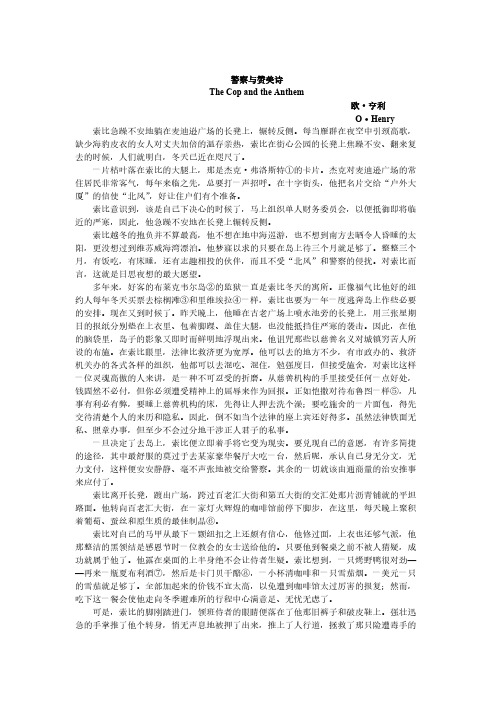
警察与赞美诗The Cop and the Anthem欧·亨利O·Henry 索比急躁不安地躺在麦迪逊广场的长凳上,辗转反侧。
每当雁群在夜空中引颈高歌,缺少海豹皮衣的女人对丈夫加倍的温存亲热,索比在街心公园的长凳上焦躁不安、翻来复去的时候,人们就明白,冬天已近在咫尺了。
一片枯叶落在索比的大腿上,那是杰克·弗洛斯特①的卡片。
杰克对麦迪逊广场的常住居民非常客气,每年来临之先,总要打一声招呼。
在十字街头,他把名片交给“户外大厦”的信使“北风”,好让住户们有个准备。
索比意识到,该是自己下决心的时候了,马上组织单人财务委员会,以便抵御即将临近的严寒,因此,他急躁不安地在长凳上辗转反侧。
索比越冬的抱负并不算最高,他不想在地中海巡游,也不想到南方去晒令人昏睡的太阳,更没想过到维苏威海湾漂泊。
他梦寐以求的只要在岛上待三个月就足够了。
整整三个月,有饭吃,有床睡,还有志趣相投的伙伴,而且不受“北风”和警察的侵扰。
对索比而言,这就是日思夜想的最大愿望。
多年来,好客的布莱克韦尔岛②的监狱一直是索比冬天的寓所。
正像福气比他好的纽约人每年冬天买票去棕榈滩③和里维埃拉④一样,索比也要为一年一度逃奔岛上作些必要的安排。
现在又到时候了。
昨天晚上,他睡在古老广场上喷水池旁的长凳上,用三张星期日的报纸分别垫在上衣里、包着脚踝、盖住大腿,也没能抵挡住严寒的袭击。
因此,在他的脑袋里,岛子的影象又即时而鲜明地浮现出来。
他诅咒那些以慈善名义对城镇穷苦人所设的布施。
在索比眼里,法律比救济更为宽厚。
他可以去的地方不少,有市政办的、救济机关办的各式各样的组织,他都可以去混吃、混住,勉强度日,但接受施舍,对索比这样一位灵魂高傲的人来讲,是一种不可忍受的折磨。
从慈善机构的手里接受任何一点好处,钱固然不必付,但你必须遭受精神上的屈辱来作为回报。
正如恺撒对待布鲁图一样⑤,凡事有利必有弊,要睡上慈善机构的床,先得让人押去洗个澡;要吃施舍的一片面包,得先交待清楚个人的来历和隐私。
The Cop and the Anthem 警察与赞美诗 欧亨利
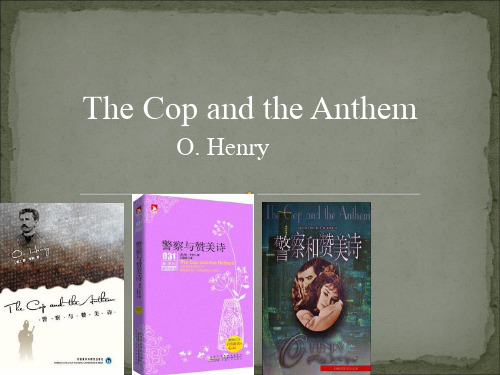
On the opposite side of the street was a restaurant of no great pretensions. It catered to large appetites and modest purses. Its crockery and atmosphere were thick; its soup and napery thin. Into this place Soapy took his accusive shoes and telltale trousers without challenge. At a table, he sat and consumed beefsteak、 flapjacks、doughnuts and pie. And then to the waiter be betrayed the fact that the minutest coin and himself were strangers.
Wrong society and human nature
Thank you!
The Cop and the Anthem
O. Henry
O. Henry
1862-1910
William Sidney Porter
• The Harrells, with whom Porter stayed in Austin,
had a cat named Henry that Porter would Play with. The cat would come running when Porter would shout “Oh, Henry!” • William Trevor writes that when Porter was in the Ohio State Penitentiary "there was a prison guard named Orrin Henry, whom William Sydney Porter . . . immortalized as O. Henry". • The writer and scholar Guy Davenport offers another explanation: "The pseudonym that he began to write under in prison is constructed from the first two letters of Ohio and the second and last two of penitentiary."
重大版英语BOOK6the cop and the anthem课件
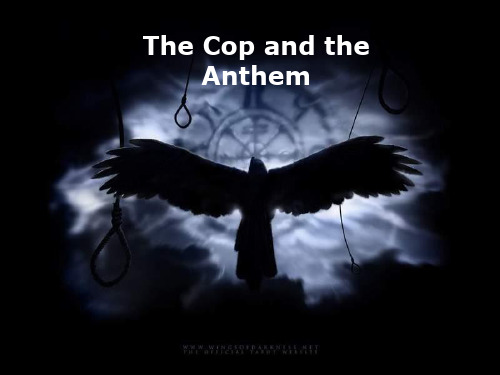
When these words meet together, what will happen? Make up a story.
pickpocket cop
reform arrest
When you tell a story, what aspects will be included?
When? Who?
2. His coat and tie were decent(得体的). But his boots and trousers were shabby.
A. unfair B. worn C. clean D. invisible 3. “Arrest seemed but a rosy dream” in para.11 means____. A. to be arrested seemed to be such a beautiful thing for him. B. to be arrested was what Soapy wanted C. it seems impossible for Soapy to be arrested D. He would be arrested as he hoped.
Give the story another title.
Reality and Dream Smile with Tear God’s Joke …
Summary:
Soapy—pickpocket—arrest—prison In a brightly-lit cafe — unsuspected—head waiter—
Soapy’s ways to realize his dream:
Place
ห้องสมุดไป่ตู้
the cop and the anthem英语课文翻译
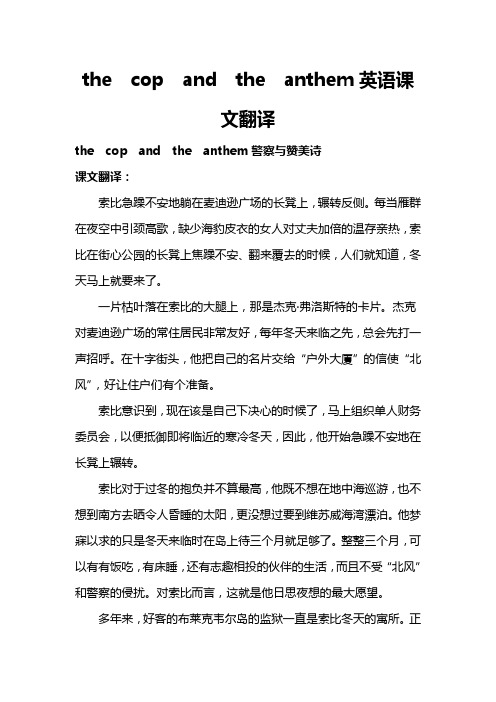
the cop and the anthem英语课文翻译the cop and the anthem警察与赞美诗课文翻译:索比急躁不安地躺在麦迪逊广场的长凳上,辗转反侧。
每当雁群在夜空中引颈高歌,缺少海豹皮衣的女人对丈夫加倍的温存亲热,索比在街心公园的长凳上焦躁不安、翻来覆去的时候,人们就知道,冬天马上就要来了。
一片枯叶落在索比的大腿上,那是杰克·弗洛斯特的卡片。
杰克对麦迪逊广场的常住居民非常友好,每年冬天来临之先,总会先打一声招呼。
在十字街头,他把自己的名片交给“户外大厦”的信使“北风”,好让住户们有个准备。
索比意识到,现在该是自己下决心的时候了,马上组织单人财务委员会,以便抵御即将临近的寒冷冬天,因此,他开始急躁不安地在长凳上辗转。
索比对于过冬的抱负并不算最高,他既不想在地中海巡游,也不想到南方去晒令人昏睡的太阳,更没想过要到维苏威海湾漂泊。
他梦寐以求的只是冬天来临时在岛上待三个月就足够了。
整整三个月,可以有有饭吃,有床睡,还有志趣相投的伙伴的生活,而且不受“北风”和警察的侵扰。
对索比而言,这就是他日思夜想的最大愿望。
多年来,好客的布莱克韦尔岛的监狱一直是索比冬天的寓所。
正像福气比他好的纽约人每年冬天买票去棕榈滩和里维埃拉一样,索比也要为一年一度逃奔岛上作些必要的安排。
而现在时候又到了。
昨天晚上,他睡在古老广场上喷水池旁的长凳上,用三张星期日的报纸分别垫在上衣里、包着脚踝、盖住大腿,也没能成功抵挡住严寒的袭击。
因此,在他的脑袋里,岛子的影象又即时而鲜明地浮现出来。
他诅咒那些以慈善名义对城镇穷苦人所设的布施。
在索比眼里,法律比救济更为宽厚。
他可以去的地方不少,有市政办的、救济机关办的各式各样的组织,他都可以去混吃、混住,勉强度日,但接受这种施舍,对索比这样一位灵魂高傲的人来讲,是一种难以忍受的折磨。
从慈善机构的手里接受任何一点好处,钱固然不必付,但你必须遭受精神上的屈辱来作为回报。
正如恺撒对待布鲁图一样,凡事有利必有弊,要睡上慈善机构的床,先得让人押去洗个澡;要吃施舍的一片面包,得先交待清楚个人的来历和隐私。
The Cop And The Anthem
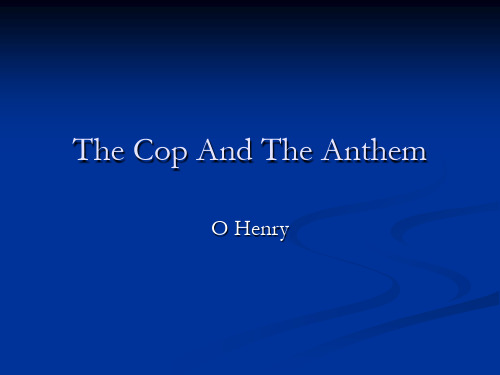
作品简介
ቤተ መጻሕፍቲ ባይዱ
流浪汉苏比在冬天来临之际,想方设 法到监狱过冬,他六次犯事,为非作歹, 可是都没有如愿,正当他听到教堂赞美诗, 决定重新做人时,却被莫名其妙逮捕了, 小说的矛头直指当时美国社会,真实的反 映了不明是非,颠倒黑白的社会的现实。
"No cop for you," said the waiter. "Hey!" In a moment Soapy found himself lying upon his left ear on the pavement. He arose with difficulty, and beat the dust from his clothes. Arrest seemed a rosy dream. The Island seemed very far away. A policeman who stood before a drug store two doors away laughed and walked down the street. Soapy seemed to liberty. After another unsuccessful attempt to be arrested for persecution a young woman, Soapy went further toward the district of theatres. When he came upon a policeman standing in front of a glittering theatre, he caught at the straw of "disorderly conduct." On the sidewalk Soapy began to sing drunken songs at the top of his voice. He danced, howled, and otherwise disturbed the peace. The policeman turned his back to Soapy, and said to a citizen: "It is one of the Yale lads celebrating their football victory over the Hartford College. Noisy, but no harm. We have instructions not to arrest them." Sadly, Soapy stopped his useless singing and dancing. A sudden fear seized him. Was he immune to arrest? Would never a policeman lay hands on him? The Island seemed an unattainable Arcadia. He buttoned his thin coat against the north wind. In a cigar store he saw a well-dressed man lighting a cigar. He had set his silk umbrella by the door, Soapy entered the store, took the umbrella, and went out with it slowly. The man with the cigar followed hastily. "My umbrella," he said. "Oh, is it?" said Soapy. "Well, why don't you call a policeman? I took it. Your umbrella! Why don't you call a cop? There stands one on the corner." The umbrella owner slowed his steps. Soapy did likewise. The policeman looked at them curiously. "Of course," said the umbrella man, "that is - well, you know how these mistakes occur - I - if it's your umbrella I hope you'll excuse me - I picked it up this morning in a restaurant - if it is yours, why - I hope you'll -" "Of course it's mine," said Soapy. The ex-umbrella man retreated. The policeman hurried to help a well-dressed woman across the street. Soapy walked eastward. He threw the umbrella angrily into a pit. He was angry with the men who wear helmets and carry clubs. Because he wanted to be arrested, they seemed to regard him as a king who could do no wrong. At last Soapy reached one of the avenues to the east where it was not so noisy. He went towards Madison Square, for the home instinct remains even when the home is a park bench. But on a quiet corner Soapy stopped before an old church. Through one window a soft light glowed, where, no doubt, the organist played a Sunday anthem. For there came to Soapy's ears sweet music that caught and held him at the iron fence. The moon was shining; cars and pedestrians were few; birds twittered sleepily under the roof. And the anthem that the organist played cemented Soapy to the iron fence, for he had known it well in the days when his life contained such things as mothers and roses and ambitions and friends. The influence of the music and the old church produced a sudden and wonderful change in Soapy's soul. He saw with horror the pit into which he had fallen. He thought of his degraded days, dead hopes and wrecked faculties. And also in a moment a strong impulse moved him to battle with his desperate fate. He would pull himself out of this pit; he would make a man of himself again. There was time; he was young yet. Those sweet organ notes had set up a revolution in him. Tomorrow he would be somebody in the world. He would Soapy felt a hand on his arm. He looked quickly around into the broad face of a policeman. "What are you doing here?" asked the policeman. "Nothing," said Soapy. "Then come along," said the policeman. "Three months on the Island," said the Magistrate in the Police Court the next morning.
The cop and the anthem警察和赞美诗
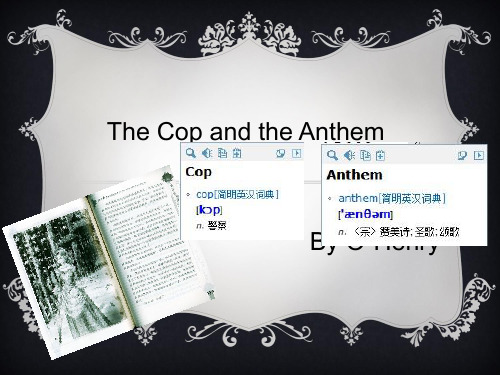
By O· Henry
Brief Introduction
Maupassant 莫泊桑
ห้องสมุดไป่ตู้
Chekhov 契科夫
O· Herny 欧· 亨利
Brief Introduction
《The Cop and the Anthem》 is one of the representative works of O. Henry. O. Henry's work was acclaimed as the "Encyclopedia of American life humor."
Brief Introduction
This novel describes a poor unemployed, homeless people. He wanted the prison to shelter himself, so he committed crime intentionally. But he met few troublemakers. So he failed to achieve his goal.
Black Humor
"Black Humor" is an American trend in contemporary literature. American writer, Bruce Jay Friedman believes that "black humor" is a black thing in the thoughts and feelings on things and the combination of humor: it is humorous, but contains a gloomy thing; it is desperate, but in the will laughter.
the cop and the anthem课文及翻译
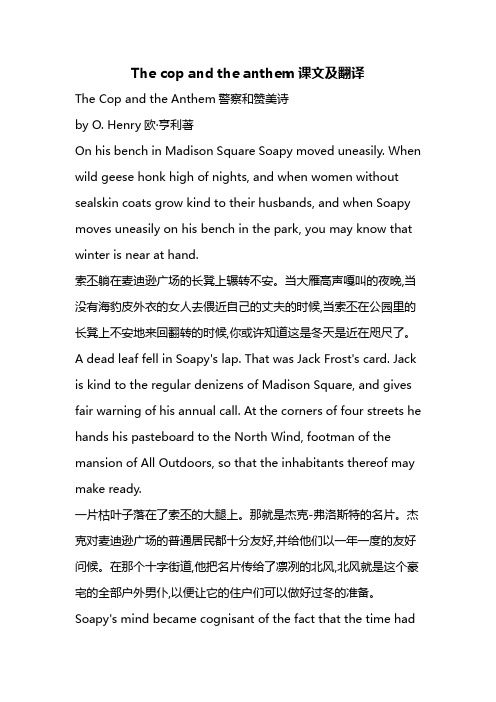
The cop and the anthem课文及翻译The Cop and the Anthem警察和赞美诗by O. Henry欧·亨利著On his bench in Madison Square Soapy moved uneasily. When wild geese honk high of nights, and when women without sealskin coats grow kind to their husbands, and when Soapy moves uneasily on his bench in the park, you may know that winter is near at hand.索丕躺在麦迪逊广场的长凳上辗转不安。
当大雁高声嘎叫的夜晚,当没有海豹皮外衣的女人去偎近自己的丈夫的时候,当索丕在公园里的长凳上不安地来回翻转的时候,你或许知道这是冬天是近在咫尺了。
A dead leaf fell in Soapy's lap. That was Jack Frost's card. Jack is kind to the regular denizens of Madison Square, and gives fair warning of his annual call. At the corners of four streets he hands his pasteboard to the North Wind, footman of the mansion of All Outdoors, so that the inhabitants thereof may make ready.一片枯叶子落在了索丕的大腿上。
那就是杰克-弗洛斯特的名片。
杰克对麦迪逊广场的普通居民都十分友好,并给他们以一年一度的友好问候。
The Cop and the Anthem翻译赏析与对比

圈套在桨座的钉子上,身 子前冲,抵消桨片在水中 所遇到的阻力,在黑暗中 划出港去。P20 B2他把桨上绑着的绳子套 在船边的木拴上,身子前 倾推着划水的桨,渐渐的 划出了黑暗中的海港。P28
lean :to bend or move from a vertical position. 前俯或后仰仰 。lean forward:前俯,前倾。 lean against:to rest on or against sth for support 倚,靠。(牛津高阶英汉双解词典p1148)
译者简介
吴劳 上海翻译家协会会员 ,毕业於上海圣约翰大 学英国文学系。历任上 海译文出版社编辑,编 审,全国美国文学研究 会理事 朱莉萍——不详
Two Editions of the Book
吴劳版—B1
朱莉萍版—B2
译文对比
• He was an old man who fished alone in a skiff in the Gulf Stream and . In the first forty days a boy had been with him. But after forty days without a fish, the boy’s parents had told him that the old man was now definitely and finally salao, which is the worst form of unlucky, and the boy had gone at their order in another boat…
Everything about him was old except his eyes and they were the same color as the sea and were cheerful and undefeated
thecopandtheanthem
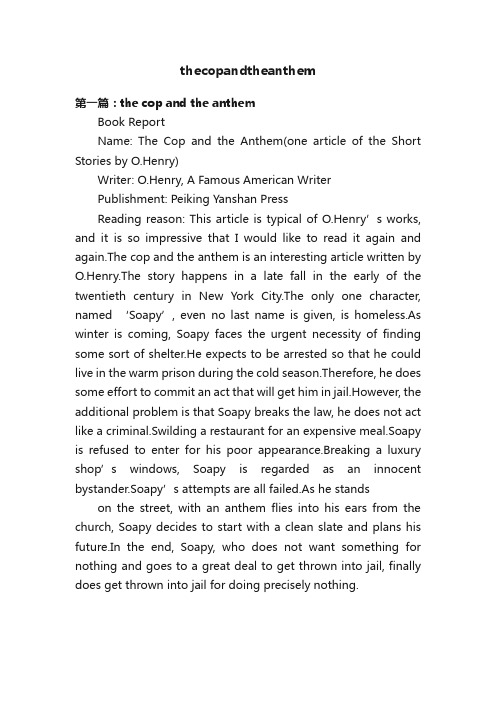
thecopandtheanthem第一篇:the cop and the anthemBook ReportName: The Cop and the Anthem(one article of the Short Stories by O.Henry)Writer: O.Henry, A Famous American WriterPublishment: Peiking Yanshan PressReading reason: This article is typical of O.Henry’s works, and it is so impressive that I would like to read it again and again.The cop and the anthem is an interesting article written by O.Henry.The story happens in a late fall in the early of the twentieth century in New York City.The only one character, named ‘Soapy’, even no last name is given, is homeless.As winter is coming, Soapy faces the urgent necessity of finding some sort of shelter.He expects to be arrested so that he could live in the warm prison during the cold season.Therefore, he does some effort to commit an act that will get him in jail.However, the additional problem is that Soapy breaks the law, he does not act like a criminal.Swilding a restaurant for an expensive meal.Soapy is refused to enter for his poor appearance.Breaking a luxury shop’s windows, Soapy is regarded as an innocent bystander.Soapy’s attempts are all failed.As he stands on the street, with an anthem flies into his ears from the church, Soapy decides to start with a clean slate and plans his future.In the end, Soapy, who does not want something for nothing and goes to a great deal to get thrown into jail, finally does get thrown into jail for doing precisely nothing.。
警察与赞美诗 剧本
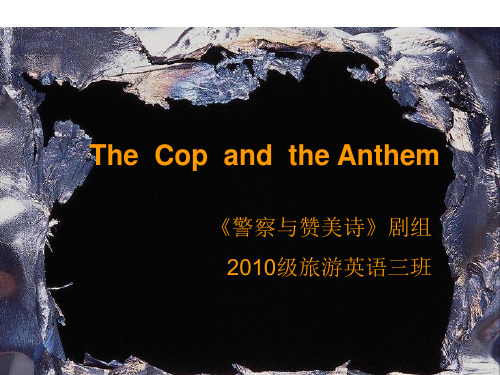
S: No, no, no....Please! Don’t come close! I’ll call the police! No! Help!
P: You such a lying ass!! Don’t run! I’m excellent! Trust me!!
Scene Three
S: And that cute fat cop will catch me, and accuse me, for molesting a woman! Well! Hello! The bed in jail. I’m coming!
S: Hi, Babe, Have you ever seen me before? You just look so familiar! Wanna a chat? Or, come to my place? En hen? We can go deep inside to our topic. Hahahaha!
S: I don’t even know Obama, I only know you…
G: whatever, stop nagging me, or I will treat you as your neighbor Zang Tianshuo, possibly a life time in prison…
Soapy:Oh no, sir, I did it, seriously! I did it! : Don't go~
Police:Get away! :
Soapy:Uncle Cop, show mercy on me, I : wanna go to the jail, 555555555~~~
Soapy:…A shop window! Haha~ I will call up my : cop brother with your anthem of cracking~
The_Cop_and_the_Anthem_警察与赞美诗

His attempts failed~~~
~· ~· ~· ~· ~· ~· ~· ~· ~· ~· ~· ~· ~· ~· ~· ~· ~· ~· ~· ~· ~· ~
He passed by a church and heard the Sabbath anthem . The influences about the old church wrought a sudden and wonderful change in his soul…
• .
Hymns music not only made him drunk, and when he was thinking of life and love, ambition, friends, pure thoughts and decent clothes these beautiful things ,but also he felt life is good. At this time in his soul seems to be constantly running, and find himself
The 3rd step
Soapy entered a little restaurant and ate steak and pie, then he told the waiter that he had no money. The waiter pushed Soapy into the street.
The 5th step
Soapy disguised as a drunkard to disturbed the peace, the policeman paid no attention to Soapy. Moreover the cop thought he was a college student celebrating a win in a football game.
- 1、下载文档前请自行甄别文档内容的完整性,平台不提供额外的编辑、内容补充、找答案等附加服务。
- 2、"仅部分预览"的文档,不可在线预览部分如存在完整性等问题,可反馈申请退款(可完整预览的文档不适用该条件!)。
- 3、如文档侵犯您的权益,请联系客服反馈,我们会尽快为您处理(人工客服工作时间:9:00-18:30)。
by O .Henry
1 On his bench in Madison Square Soapy moved uneasily. When wild goose honk high of nights, and when women without sealskin coats grow kind to their husbands, and when Soapy moves uneasily on his bench in the park, you may know that winter is near at hand.
2 A dead leaf fell in Soapy’s lap. That was Jack Frost’s card. Jack is kind to the regular denizens of Madison Square, and gives fair warning of his annual call. At the corners of streets his four hands his pasteboard to the North Wind, footman of the mansion of All Outdoors, so that the inhabitants there of may make ready.
3 Soapy’s mind became cognisant of the fact that the time had come for him to resolve himself into a singular Committee of Ways and Means to provide against the coming rigour . And therefore he moved uneasily on his bench.
7 Soapy left his bench and strolled out of the square and across the level sea of asphalt, where Broadway and Fifth Avenue flow together. Up Broadway he turned, and halted at a glittering café, where are gathered together nightly the choicest products of the grape, the silkworm and the protoplasm.
5 For years the hospitable Blackwell’s had been his winter quarters. Just as his more fortunate fellow New Yorkers had bought their tickets to Palm Beach and the Riviera each winter, so Soapy had made his humble arrangements for his annual hegira to the Island. And now the time was come. On the previous night three Sabbath newspapers, distributed beneath his coat, about his ankles and over his lap, had failed to repulse the cold as he slept on his bench near the spurting fountain in the ancient square. So the Island loomed large and timely in Soapy’s mind. He scorned the provisions made in the name of charity for the city’s dependents. In Soapy’s opinion the Law was more benign than Philanthropy. There was an endless round of institutions, municipal and eleemosynary, on which he might set out and receive lodging and food accordant with the simple life. But to one of Soapy’s proud spirit the gifts of charity are encumbered. If not in coin you must pay in humiliation of spirit for every benefit received at the hands of philanthropy. As Cesar had his Brutus, every bed of charity must have its toll of a bath, every loaf of bread its compensation of a private and personal inquisition. Wherefore it is better to be a guest of the law, which though conducted by rules, does not meddle unduly with a gentleman’s private affairs.
12 “Where’s the man that done that?” inquired the officer excitedly.
13 “Don’t you figure out that I might have had something to do with it?” said Soapy, not without sarcasm, but friendly, as one greets good fortune.
10 Soapy turned off Broadway. It seemed that his route to the coveted island was not to be an epicurean one. Some other way of entering limbo must beded to go to the Island, at once set about accomplishing his desire. There were many easy ways of doing this. The pleasantest was to dine luxuriously at some expensive restaurant; and then, after declaring insolvency, be handed over quietly and without uproar to a policeman. An accommodating magistrate would do the rest.
11 At a corner of Sixth Avenue electric lights and cunningly displayed wares behind plate-glass made a shop window conspicuous. Soapy took a cobble-stone and dashed it through the glass. People came running round the corner, a policeman in the lead. Soapy stood still, with his hands in his pockets, and smiled at the sight of brass buttons.
9 But as Soapy set foot inside the restaurant door the head waiter’s eye fell upon his frayed trousers and decadent shoes. Strong and ready hands turned him about and conveyed him in silence and haste to the sidewalk and averted the ignoble fate of the menaced mallard.
8 Soapy had confidence in himself from the lowest button of his vest upward. He was shaven, and his coat was decent and his neat black, ready-tied four-in-hand had been presented to him by a lady missionary on Thanksgiving Day. If he could reach a table in the restaurant unsuspected, success would be his. The portion of him that would show above the table would raise no doubt in the waiter’s mind. A roasted mallard duck, thought Soapy, would be about the thing—with a bottle of Chablis, and then Camembert, a demi-tasse and a cigar. One dollar for the cigar would be enough. The total would not be so high as to call forth any supreme manifestation of revenge from the café management; and yet the meat would leave him filled and happy for the journey to his winter refuge.
